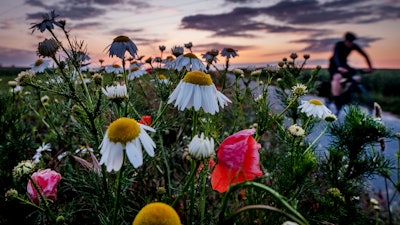
BRUSSELS (AP) — Environmental groups are urging the European Union to take drastic action to protect insects, saying in a report Tuesday that more than 40% of the world’s insect species are in decline because of pesticide use and industrial farming.
Friends of the Earth Europe and the Heinrich-Böll-Stiftung, a think tank with close ties to the German Green Party, said the EU's strategy to protect biodiversity and develop organic farming is not enough, as one-third of all inspect species are threatened with extinction.
“The evidence is clear: pesticide use is wiping out insect populations and ecosystems around the world, and threatening food production," said Mute Schimpf of Friends of the Earth Europe.
The group said at least 1 in 10 bee and butterfly species in Europe is threatened with extinction, raising fears of an ensuing impact on crop production. According to figures released by the European Parliament, about 84% of crop species and 78% of wildflowers across the EU depend to some extent on animal pollination.
As part of its goal to cut greenhouse gas emissions to zero by mid-century, the EU commission said last month it wants to halve the use of chemical pesticides by 2030. It also wants to ensure that at least 25% of agricultural land across the 27-nation bloc is reserved for organic farming, compared to 8% at the moment. The commission also wants to plant at least 3 billion trees over the next 10 years.
Barbara Unmüßig, the president of Heinrich-Böll-Stiftung, said the loss of insects is so important that the EU's current plans are not sufficient. She said the reshaping of the EU’s common agricultural policy (CAP) is required to ensure the promotion of an “insect and climate-friendly agriculture."
Friends of the Earth Europe and Heinrich-Böll-Stiftung are also campaigning for a new law to drastically cut pesticide use by 80% by 2030.
“Just 20% of all producers in Europe get 80% of CAP subsidies, this can not be justified any longer," she said. “Large area subsidies from which only a few big farms benefit have to be redirected into supporting small, environmentally and socially viable farming.“
According to figures released by the groups, the worldwide use of pesticide rose five-fold over the past 70 years as factory farming developed. To reduce their use, they are proposing that at least half of the EU's agricultural budget will be set aside for green goals and to support farmers willing to implement techniques that help farmland ecosystems.
The EU says it has very strict rules concerning pesticides. Earlier this year, the bloc’s executive arm decided not to renew approval for a neonicotinoid known as thiacloprid because of health and environment concerns. In 2018, EU regulators banned three prevalent neonicotinoid pesticides on all crops grown outdoors after scientific evidence showed their risks.






















